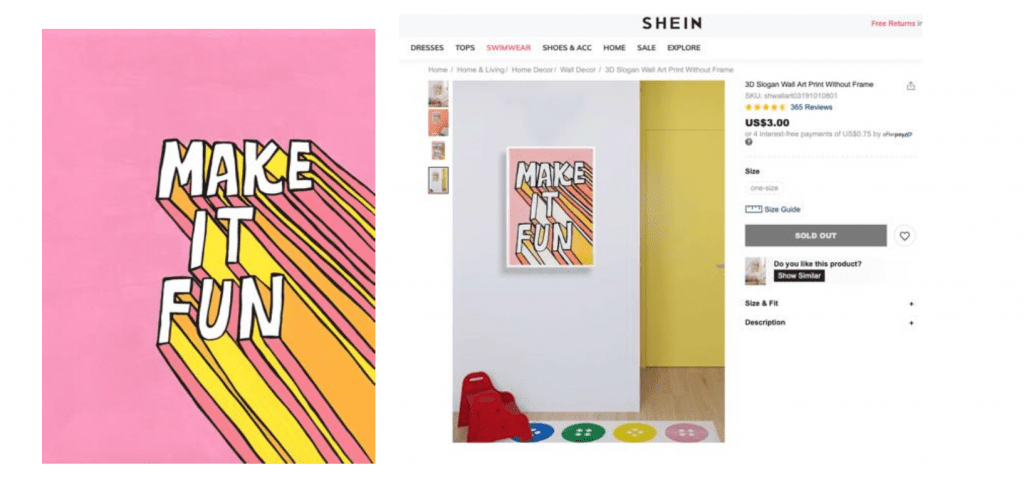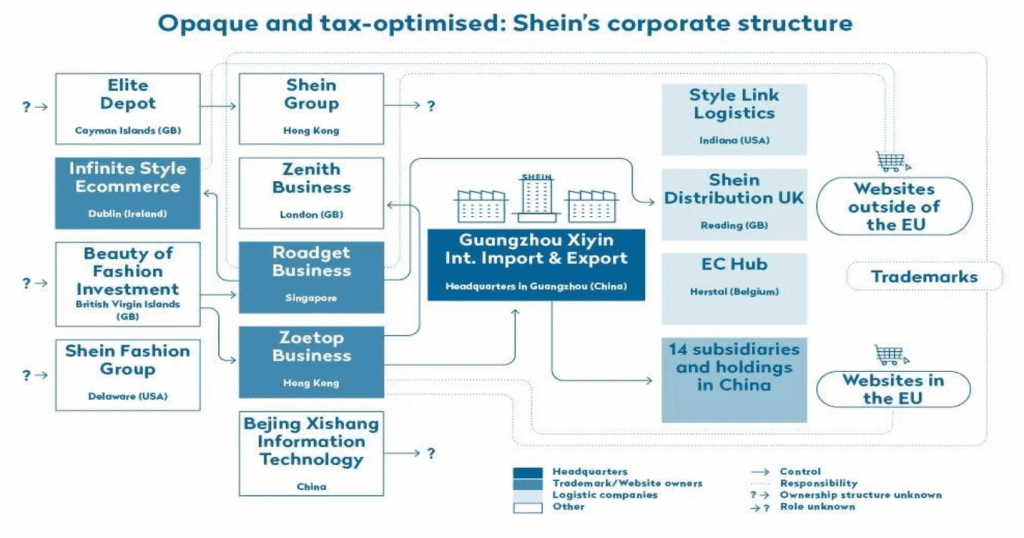Shein is facing a new lawsuit that accuses the Chinese retail titan of not only carrying out “large-scale and systematic intellectual property theft from U.S. designers large and small,” but of also engaging in infringement-related racketeering activities in the process. According to the complaint that they filed in a California federal court on Tuesday, independent designers Krista Perry, Larissa Martinez, and Jay Baron claim that Shein and various related entities, including Roadget Business and Zoetop Business, (collectively, “Shein”) are on the hook for copyright and trademark infringement in connection with their practice of “produc[ing], distribut[ing], and selling exact copies of their creative works,” which they allege is “part and parcel of Shein’s ‘design’ process and organizational DNA.”
In the newly-filed lawsuit, Perry, Martinez, and Baron (the “plaintiffs”) assert that “[t]here is no Coco Chanel or Yves Saint Laurent behind the Shein empire. Rather, there is a mysterious tech genius, Xu Yangtian aka Chris Xu,” who has made Shein “the world’s top clothing company through high technology, not high design.” In particular, the plaintiffs claim that Shein has “made billions [of dollars] by creating a secretive algorithm that astonishingly determines nascent fashion trends—and by coupling it with a corporate structure, including production and fulfillment schemes, that are perfectly executed to grease the wheels of the algorithm, including its unsavory and illegal aspects.” That algorithm “could not work without generating the kinds of exact copies that can greatly damage an independent designer’s career,” the plaintiffs assert, noting that “Shein’s artificial intelligence is smart enough to misappropriate the pieces with the greatest commercial potential.”
Algorithmic “Infringement”
While it is “impossible to say how the Shein algorithm produces its results” without investigation, the plaintiffs claim that what is immediately clear is the level of infringement being carried out by Shein, with the company’s “pattern of misconduct involv[ing] the commission of new copyright and trademark infringements every day.” What else is clear, the plaintiffs assert, is how the Shein distribution model works, with the company intentionally “produc[ing] very small quantities of [its] item for sale.” For each new product sold on Shein’s website, the plaintiffs claim that the initial production run is as low as 100-200 units per SKU, compared to “the thousands of pieces typically produced by traditional peer retailers.” The purpose of this is that it enables Shein to “wait to see if anybody complains that the design was stolen,” and if they do, it can swiftly settle with the company. The plaintiffs cite Nike as an example of a big company that might quickly flag and fight an infringement offered up by Shein.
“When Shein copies a small or independent designer, the most likely outcome (without brand protection specialists and specialized software on the lookout) is that the infringement will go unnoticed,” the plaintiffs state. “Under those circumstances, Shein reaps all the benefits of stealing and featuring the design that its technology had identified as valuable enough to take: it makes sales and keeps it customers’ eyes glued to the Shein site and app for that much longer. And if customer demand justifies it, the item is reordered, and more are sold (now that the coast has been determined to be clear).”

As for the infringements at play in the case at hand, they are “truly exact copies of [the plaintiffs’] copyrightable graphic designs,” which have appeared on Shein products, including Perry’s “Make It Fun” artwork and “Floral Bloom” design, Barron’s “Trying My Best” artwork, and Blintz’s “Orange Daisies” design. (Barron’s “Trying My Best” artwork is not only a registered copyright but the phrase, itself, is a trademark, per Barron, thereby, giving rise to both copyright and trademark infringement causes of action.)
Shein has infringed these copyright-protected artworks, per the plaintiffs, by offering up “mechanical, infringing cop[ies]” without their permission, license, or consent. As a result of such alleged infringement, the plaintiffs assert that they “have suffered and will continue to suffer substantial damage” to their businesses in the form of diversion of trade, loss of profits, and “a diminishment in the value of their designs and art, their rights, and their reputations,” the latter of which have been “irreparably tarnished, diminishing the value of [their] works, and decreasing revenue derived from [their] work.”
Alleged RICO Activity
In light of the already-long-list of infringement lawsuits that have been waged against Shein, the particularly interesting aspect of the new complaint comes by way of the plaintiffs’ Racketeer Influenced and Corrupt Organizations (“RICO”) Act claims, which stem from Shein’s alleged infringement scheme. Setting the stage here, the plaintiffs assert that the civil prong of the RICO Act was designed to “address the misconduct of culpable individual cogs in a larger enterprise.” It is well established, they assert, that “egregious copyright infringement (of the type alleged here, and of the type referenced in other similar cases against Shein) constitutes racketeering.” (This is pursuant to a 2005 act of Congress to add “criminal infringement of a copyright” to the definition of “racketeering activity.”)
A civil RICO Act claim is appropriate here, according to the plaintiffs, as Shein’s alleged misconduct is “committed not by a single entity, but by a de-facto association of entities, [and] just as intended by Congress, the same decentralization that facilitates Shein’s criminal infringement and other racketeering activity, renders individual components of the enterprise, such as the defendants, liable under civil RICO.” In terms of the Shein structure, the plaintiffs contend that “the Shein Enterprise constitutes a group of persons associated together for the common purpose of operating the Shein overall business.”
Part of the purpose of the “confusing corporate structure and its asserted decentralized nature” is to “avoid liability and even to avoid disclosing basic information,” the plaintiffs argue. Specifically, Shein’s “multiplicity of entities and [outwardly] decentralization structure … aid in its efforts to avoid liability for intellectual property infringement.” For instance, the plaintiffs state that “research on prior cases reveals that … Shein is not above out-and-out deception—which is rendered easier by its decentralized nature. Recently, Levi’s alleged that Shein, after agreeing to cease selling a certain design, and changing the items shown for sale on the Shein website in a mutually agreeable manner, a test purchase revealed that Shein was in fact still selling the original infringing product.”
Another example: When it receives a copyright or trademark cease and desist letter or lawsuit, “Shein’s first line of defense generally couples removing the product from its sites with blaming the misconduct on another [Shein entity] actor (implying such actor is independent).” This is especially effective, they claim, as “unrepresented parties and most unsophisticated attorneys assume this other company is fully independent of the [Shein] entity being sued.”

In reality, the plaintiffs state that the many Shein entities are all connected. Given that each of the various Shein defendants has “knowingly committed criminal copyright infringement, [and] played its role with full knowledge of the overarching criminal copyright infringement it participates in,” the plaintiffs allege that Shein is engaging in “multiple acts of racketeering and criminal copyright infringement.” In other words, such activity “consists of multiple acts of racketeering and criminal copyright infringement by the defendants, [which] is interrelated, not isolated, and is perpetrated for the same or similar purposes by the same persons, including Mr. Xu and the Shein leadership.”
With the foregoing in mind, the plaintiffs set out claims of copyright infringement and trademark infringement, as well as for violations of the Racketeer Influenced and Corrupt Organizations Act, namely sections 1962(c) and 1964(c), which respectively prohibit any person from operating or managing an enterprise through a pattern of racketeering activity and give rise to a cause of action for violations of section 1962. The plaintiffs are seeking monetary damages to be determined at trial and injunctive relief to bar the Shein defendants from further engaging in the “misconduct” at the heart of the lawsuit.
A rep for Shein Group was not immediately available for comment.
The case is Perry, et al., v. Shein Distribution Corp., et al., 2:23-cv-05551 (C.D. Cal.).














